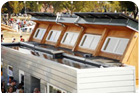Oct. 24, 2007 - German Technical University Wins 2007 Solar Decathlon

The Technische Universität Darmstadt (Darmstadt, Germany) earned top honors in the U.S. Department of Energy’s 2007 Solar Decathlon competition Oct. 12-20, held on the National Mall in Washington. The Solar Decathlon challenged 20 university-led teams from the U.S. and as far away as Puerto Rico, Spain, Germany and Canada to design, build, and operate the most attractive and energy-efficient solar-powered home.
“I want to congratulate this year’s Solar Decathlon champion Technische Universität Darmstadt and the 19 other teams for their innovative designs and application of solar technologies,” said Energy Secretary Samuel W. Bodman. “The Solar Decathlon is a great demonstration of the ways in which technology, science and design can be blended in the production of net-zero-energy homes. Promoting the early commercialization of solar and other energy-efficient technologies will help secure America’s clean energy future.”
The Solar Decathlon’s homes are net-zero-energy, yield zero carbon, and include the latest high-tech solutions and money-saving benefits to consumers, without sacrificing comfort, convenience and aesthetics. Each house must also produce enough “extra” energy to power an electric vehicle.
Many of the solar power and building technologies showcased on the National Mall are currently available for purchase and use. Teams have worked for more than two years designing, building, and testing their homes.
The 20 teams included Carnegie Mellon University (Pittsburgh, Pa.); Cornell University (Ithaca, N.Y.); Georgia Institute of Technology (Atlanta, Ga.); Kansas Project Solar House - Kansas State University and University of Kansas (Manhattan, Kan.); Lawrence Technological University (Southfield, Mich.); Massachusetts Institute of Technology (Cambridge, Mass.); New York Institute of Technology (New York, N.Y.); Penn State (University Park, Pa.); Santa Clara University (Santa Clara, Calif.); Team Montréal - École de Technologie Supérieure, Université de Montréal and McGill University (Montréal, Quebec, Canada); Technische Universität Darmstadt (Darmstadt, Germany); Texas A&M University (College Station, Texas); Universidad de Puerto Rico (Mayagüez, Puerto Rico); Universidad Politécnica de Madrid (Madrid, Spain); University of Cincinnati (Cincinnati, Ohio); University of Colorado at Boulder (Boulder, Colo.); University of Illinois at Urbana-Champaign (Urbana, Ill.); University of Maryland (College Park, Md.); University of Missouri – Rolla (Rolla, Mo.); and University of Texas at Austin (Austin, Texas).

Winners
The 10 contests that make up the Solar Decathlon measure many aspects of a home’s performance and appearance. A perfect total score for all 10 contests is 1,200 points. Communications, as well as Lighting, Comfort Zone, Appliances, Hot Water, Energy Balance, and Getting Around are each worth up to 100 points. Architecture is worth up to 200 points, followed by Engineering and Market Viability, which are each worth up to 150 points and are scored subjectively.Performance was measured and points were awarded daily throughout the competition.
The overall first-place winner was the Technische Universität Darmstadt team from Germany (888.45 points), which also won the Architecture, Lighting, and Engineering contests. The Architecture Jury said the house pushed the envelope on all levels and is the type of house they came to the Decathlon hoping to see. The Lighting Jury loved the way this house glows at night. The Engineering Jury gave this team a perfect innovation score, and said nobody did the integration of the photovoltaic system any better. Darmstadt was one of seven teams to score a perfect 100 points in the Energy Balance contest.
Second place went to the University of Maryland (College Park, Md.) with 872.45 points. The Maryland team won the Communications contest and was second in Architecture, Market Viability, and Lighting. The Communications Jury praised its excellent Web site and house tour. The Architecture Jury said the house definitely belonged in the top tier. The Lighting and Market Viability juries also had high praise. They were one of seven teams to score a perfect 100 points in the Energy Balance contest.
Santa Clara University (Santa Clara, Calif.) won third place with 860.80 points. This team wanted to build a sustainable solar house that is functional, elegant, and innovative. The Communications Jury lauded its friendly, enthusiastic house tour, which was informative, entertaining, and “on target” for public audiences. They were one of five teams to score a perfect 100 points in the Hot Water contest and one of seven teams to score a perfect 100 points in the Energy Balance contest.
The individual contest winners were:
For more information on teams and overall contest results, go to the Solar Decathlon Web site at www.solardecathlon.org. To watch a slideshow from PBS' "The NewsHour with Jim Lehrer," go to www.pbs.org/newshour/indepth_coverage/science/solar_homes/slideshow/index.php?page=1#slides.

Clean Energy Grants
Secretary Bodman announced at the closing ceremonies Oct. 20 that more than $44 million would be awarded to support the commercialization and promotion of advanced solar and other clean energy technologies. Four Building America contractor teams (Building Science Corp.; IBACOS; Consortium of Advanced Residential Buildings; and Building Industry Research Alliance), along with a consortium of academic and building industry leaders, will receive up to $40 million over the next five years to develop net-zero-energy homes.These homes will be highly energy-efficient - using 70 percent less energy than homes built to current building codes - and will incorporate solar or other onsite renewable systems to provide the balance of their energy needs. This funding is part of the Building America program, a private/public partnership sponsored by the DOE that conducts systems research to improve overall housing performance, increase housing durability and comfort, reduce energy use, and increase energy security for America’s homeowners.
He also announced two regional building technology application centers at The University of Central Florida and Washington State University that will serve 17 states. The DOE awarded $4.1 million to accelerate the adoption of new and developing energy-efficient technologies by the market.
These centers will deliver information and training on commercially available energy-saving technologies, processes and tools that have been developed by the DOE and provide a regional resource for market transformation by providing technology and best practices needed to produce marketable, energy-efficient buildings.

United States, Spain To Develop Solar Decathlon Europe
The U.S. Department of Energy Assistant Secretary for Energy Efficiency and Renewable Energy Alexander Karsner and Spain’s Undersecretary of Housing Fernando Magro Fernández signed a Memorandum of Understanding to collaborate in the development of a Solar Decathlon Europe competition in 2010.“The twin challenges of increasing energy security and confronting climate change are global in nature - the solutions will require multilateral action,” Karsner said. “DOE’s Solar Decathlon is supporting a new generation of student engineers, architects, designers and communicators, while demonstrating that solar energy technologies are available here and now. With three successful Solar Decathlons to show, the Department of Energy looks forward to lending our expertise to encourage the same innovation and entrepreneurial spirit across the Atlantic and around the world.”
Under the nonbinding MOU, both countries will exchange information regarding rules, scoring, judging, safety, and site and team selection for a Solar Decathlon Europe event. Spain’s Housing Ministry will establish a framework for a European edition of Solar Decathlon in collaboration with the DOE. The initial plans call for the Solar Decathlon Europe to take place on years in which a Solar Decathlon is not taking place in the United States. Both nations will contribute members to an oversight committee, which will approve plans and activities, and evaluate success of the program.
“This event not only furthers the ties between the United States and Europe but it will also further foster the development and use of energy-efficient and sustainably developed housing throughout the world,” Magro said.
Three Solar Decathlon events have been held in the United States since 2002. DOE’s Solar Decathlon will continue to be held in the United States; the fourth event will be held in Washington, D.C. in fall 2009.
Looking for a reprint of this article?
From high-res PDFs to custom plaques, order your copy today!





